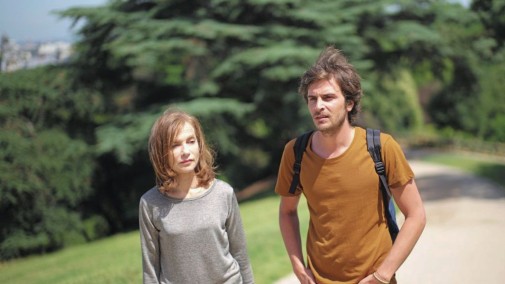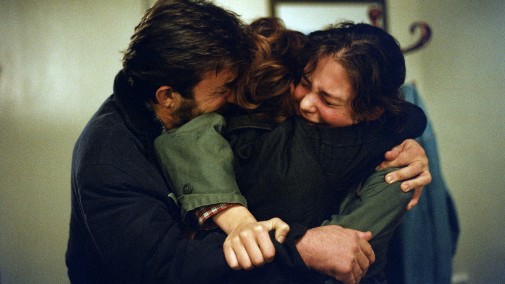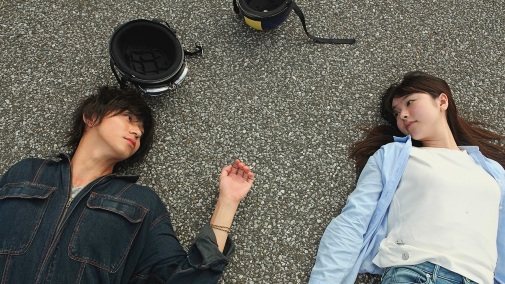We hit our halfway mark with was a hectic day at the Cannes Film Festival. Mia Hansen-Løve, Nanni Moretti, and Ryûsuke Hamaguchi all premiered films vying for the Palme d'Or. That last one is an especially curious case since, earlier in 2021, Hamaguchi already won big at the Berlinale, taking home a Silver Berlin Bear for his other 2021 movie, Wheel of Fortune and Fantasy. Beyond those three, attendees were spoiled for choice. In other programs Clio Barnard, Radu Muntean, and Sergei Loznitsa presented their latest. Even in the realm of retrospective screenings, the offer was rich, with JFK, Mulholland Drive, and the Palme d'Or victor Black Orpheus getting another day in the sun.
For simplicity's sake, this home-viewing program shall focus only on past work from the three competition directors…

THINGS TO COME (2016)
Intellectual pursuits, academic reflection, and observing the world through a prism of philosophical thought can often be taken as endeavors divorced from emotion. Consequently, cinema that investigates or follows these behaviors tends to be described as cold, alienating, inaccessible. While never one to indulge in sentiment, Mia Hansen-Løve contradicts these presumptions in Things to Come. Starring Isabelle Huppert as a pedagogue and writer reeling (or not) from unexpected divorce, maternal death, and her students' doubts, the film is a gentle character study about the search for clarity. It's not an easy subject, but the director makes it look effortless. Structurally, the film is about a busy year in this woman's life, depicting the sprawling contradictions of her days. However, it's also a breezy affair whose elliptical cuts avoid expected beats.
What one imagines as a dramatic set piece, happens quietly off-screen. Contrastingly, the connections between moments, silent car rides, and the observation of running landscapes take precedent. Things to Come is about those moments in between. It's about the thinking prelude to studied choice, reaction rather than action. The transitory instants of everyday life usually cut off from stories are this film's foundation, its reason for being. Resolutions are thus evaded as we learn to understand how Huppert's character exists in the world, how she considers it, her life, and herself. Huppert is a singularly undemonstrative actress and fits the role like a glove by embodying an essential ellipsis in human form. It's her best performance since The Piano Teacher and, for me, Things to Come is one of the finest films of the 2010s.
Streaming on Hulu, AMC+, and DirecTV.

THE SON'S ROOM (2001)
Forever a Cannes favorite, Nanni Moretti won big in 2001 when The Son's Room took the Palme d'Or. While the competition was mighty, the jury presided by Liv Ullmann preferred this subtle study on grief over such razzle-dazzle as Moulin Rouge! and Mulholland Drive. While Moretti's shooting style gives his films a humble appearance, one shouldn't undervalue their achievements, especially something as viscerally complex as The Son's Room. The film examines the aftermath of a young man's untimely end as lived by his loving family. Sounds of trauma, subtle reminders, travel from scene to scene, conversation to conversation, keeping the wound of loss bloody red and painful.
It's as if the inanities of the quotidian twisted into monstrous things, agony born out of banality, and all of it portrayed by the fantastic cast. In the role of a grieving mother, Laura Morante is a force to be reckoned with, and Nanni Moretti has never been more ruefully disarming as a leading man. Yet, as raw emotion is gradually muffled by depression, a strange mission opens the doors to catharsis. At its end, both the wise script and delicate editing jolt the picture away from pure despondence. Indeed, what most surprises about this collective portrait of familial bereavement is how it avoids emotional one-dimensionality. For how sad it is, The Son's Room ends on notes of hope, with the first rays of light breaking through after the darkest stormy clouds have gone by.
Streaming on Paramount+.

ASAKO I & II (2018)
After winning international praise for his five-hour slow-burn epic Happy Hour, Japanese filmmaker Ryûsuke Hamaguchi was first invited to the Croisette in 2018. Asako I & II was less acclaimed than its predecessor in the director's filmography, but it's worthy of serious analysis nonetheless. Subverting precepts of cinematic romance, the adaptation of a Tomoka Shibasaki novel examines the loves of its title character. Early on, Asako falls for the rebellious Baku, but he suddenly disappears. Years later, she meets Ryohei, who looks just like her former paramour while embodying an opposite personality. While the premise suggests forced contrivance, the film buckles the expectations by confronting its characters' choices with stark frankness.
Still, it's easy to imagine a similar exercise falling on its head. Unraveling as a game of portentous doubles and returns, Asako I & II upends and complicates whatever happy ending one might have hoped for. Our perception of the story is further challenged by Hamaguchi's pop formalism, his use of strident electronic music, and revolving rhythmic patterns. On a performance level, Masahiro Higashide is utterly sublime in the double role of Asako's lovers. Through different acting registers, the leading man alternates our allegiances to the on-screen characters and reveals how particular storytelling codes can kill or resurrect empathy. Early fairytale simplicity sours into alienated stylization, vulnerability freezes into apathy, each change demanding that the viewer rethink their interpretation of Asako's choices and their consequences.
Streaming on Hoopla, Kanopy, and Topic. You can also rent it from Apple iTunes.
Which of these filmmaker's new works are you most anticipating? Hansen-Løve's Bergman Island, Moretti's Three Floors, or Hamaguchi's Drive My Car?